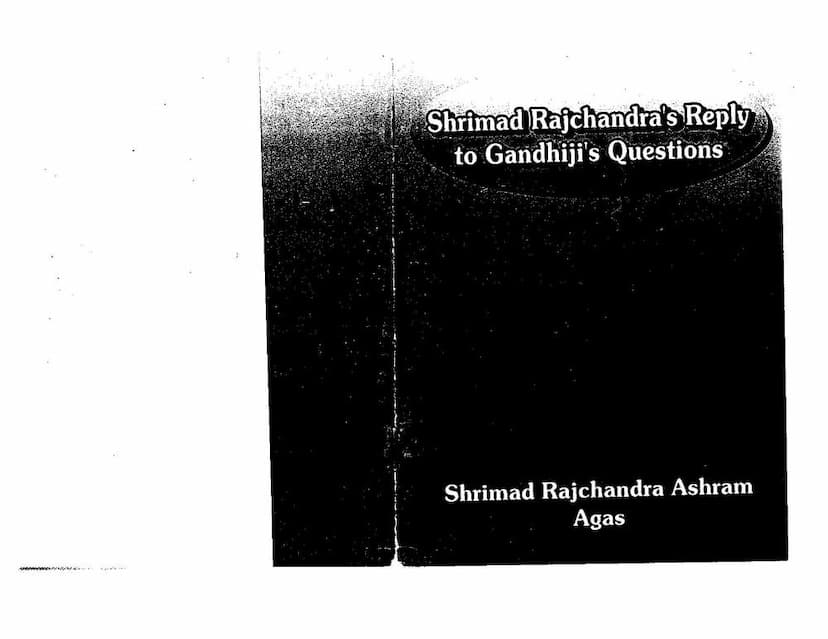Shrimad Rajchandras Replay To Gandhiji Question
Added to library: September 2, 2025

Summary
This document, "Shrimad Rajchandra's Reply to Gandhiji's Questions," published by Shrimad Rajchandra Ashram Agas, is a compilation of a significant correspondence between Mahatma Gandhi and the revered Jain saint, Shrimad Rajchandra. The booklet contains a detailed English translation of Shrimad Rajchandra's responses to 27 questions posed by Gandhiji, who sought spiritual guidance from him during his time in South Africa.
The foreword highlights the deep and beneficial association between Gandhiji and Shrimad Rajchandra, which profoundly influenced Gandhiji's religious and spiritual development. The booklet presents the original Gujarati text alongside the English translation for each question and answer, making it accessible to a wider audience.
The core of the document addresses fundamental Jain philosophical concepts, including:
- The Nature of the Soul (Atman): Shrimad Rajchandra defines the soul as an eternal, conscious entity, essentially knowledge itself, distinct from impermanent material objects. He emphasizes its unchanging nature and its role as the experiencer of happiness and suffering.
- The Soul's Actions (Karta): He explains that in a state of knowledge, the soul is the creator of its true, pure state of awareness. In ignorance, it becomes the creator of emotions like anger and greed, and consequently, the "doer" of actions that lead to karmic consequences. However, it is not the creator of the fundamental substance of material objects but rather the doer of the action of imparting a form to them.
- Karma and its Consequences: The text elaborates that karmas performed in ignorance act as seeds that mature into consequences, leading to experiences like birth, old age, and death. These are the pains the soul must suffer.
- The Nature of God (Ishvar): Shrimad Rajchandra posits that "Ishvar" is essentially another name for the soul in its pure, natural state, possessing qualities like omniscience and power. He refutes the idea of God as a separate creator of the universe, arguing that material and spiritual substances cannot originate from a purely spiritual or material God.
- Moksha (Liberation): Moksha is described as the complete cessation of ignorance-driven states, such as anger and attachment to the body. The text affirms that it is possible to experience moksha even while living in this body, through the gradual loosening of karmic bonds.
- Reincarnation: While acknowledging that a soul's destiny after death is determined by its accumulated karma, leading to rebirth as animals or in other forms, the text clarifies that the soul doesn't entirely become the inanimate object (like a stone) but inhabits it.
- The Vedas and Arya Dharma: Shrimad Rajchandra asserts that not all Indian religions necessarily originate from the Vedas. He defines Arya Dharma as the noble path that leads the soul to realize its true nature, a path he believes is more profoundly explored in India. He also discusses the ancient origins of philosophical ideas.
- The Gita and the Bible: He addresses the authorship of the Gita, suggesting that a fully enlightened person can be considered its author, aligning with the concept of "Ishvar." Regarding the Bible, he states that its claims are matters of faith, not rational proof, and questions the logic of God incarnating or having a son, as these concepts seem to contradict the nature of a pure, unattached divine being.
- Sacrifices and Religious Practices: The text condemns animal sacrifice, deeming it sinful regardless of the context. While acknowledging some merit in charitable acts during sacrifices, it criticizes them if mixed with violence.
- Proof of Religions and Christianity: Shrimad Rajchandra emphasizes the necessity of proof for any religious claim and suggests that the best religion is one that aids in destroying worldly bondage and establishing one in their essential self. He finds Christianity lacking in its explanation of the soul's anadi (without beginning) state and the law of karma.
- Miracles and Prophecies: He expresses skepticism about miracles attributed to Jesus if they violate the law of karma, but acknowledges that certain yogic powers might be responsible for some extraordinary feats. He also suggests that prophecies, while potentially indicative of great souls, are not definitive proof of divine incarnation.
- Past and Future Lives: The text states that remembering past lives or foreseeing future ones is possible for those with pure knowledge, inferring such information from one's current actions and nature.
- Buddha's Moksha: He questions whether Buddha attained moksha, based on the perceived inconsistencies and lack of perfect illumination indicated by Buddhist scriptures.
- The World's End and Progress: Shrimad Rajchandra believes the world will not perish completely but will continue in a cycle of transformation. He also states that while individual morality can improve, a complete societal shift towards absolute morality is unlikely.
- Bhakti for the Illiterate: He asserts that an illiterate person can attain moksha through bhakti (devotion), as devotion is a cause of knowledge, and pure knowledge leads to moksha.
- Avatars (Krishna and Rama): He views Krishna and Rama as highly evolved souls (maha-purushas) who were essentially "unmanifest God" but questions whether perfect Godhood was fully manifested in them. He emphasizes that true moksha comes from cultivating self-realization through the teachings of such great souls, rather than mere worship.
- Brahma, Vishnu, and Shiva: He acknowledges the symbolic or allegorical nature of these deities, often representing gunas or cosmic principles, rather than literal historical figures, and advises focusing on the underlying teachings.
- Self-Defense Against a Snake: In the face of a direct threat, he advises allowing oneself to be bitten for spiritual welfare if the body is understood as perishable. He strongly discourages killing the snake, aligning with Jain principles of non-violence.
In essence, "Shrimad Rajchandra's Reply to Gandhiji's Questions" offers a profound insight into Jain philosophy, presented through the lens of Shrimad Rajchandra's wisdom in response to Gandhiji's earnest spiritual inquiries. It highlights the importance of self-knowledge, detachment, karma, and the ultimate pursuit of liberation.